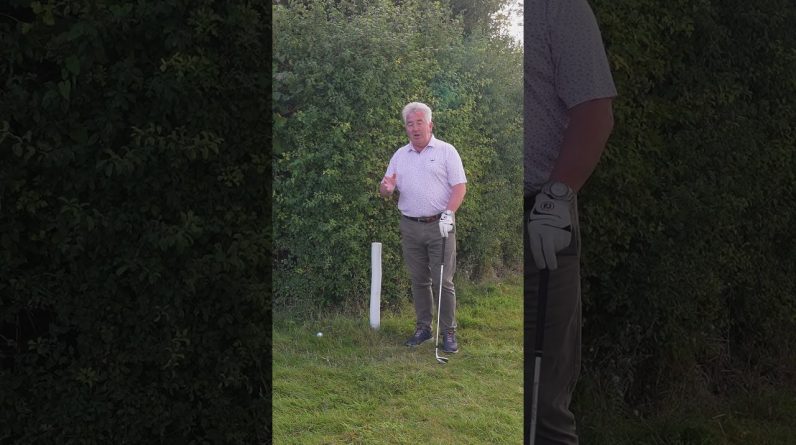So You’ve Hit It Into a Penalty Area… What Next? HereS Your Options for Relief #Golf
Golf is a game of precision and patience, but even the best players find their ball nestled in a penalty area every now and then. Whether it’s a watery hazard,a ditch,or a trouble-some bush,knowing your options for relief from penalty areas is crucial for minimizing the damage to your score and maintaining your mental composure.
Understanding What Constitutes a Penalty Area in Golf
In the latest Rules of Golf, the term “penalty area” replaces the old ”hazard” concept and includes both water hazards and other challenging areas marked by red or yellow stakes or lines. Penalty areas can be lateral (marked red) or regular (marked yellow), and the difference affects how you take relief.
- Yellow penalty area: Usually bodies of water intersecting the fairway or green front.
- red penalty area: Often lateral water hazards or other tough spots along the sides of fairways.
Penalties come with a one-stroke penalty,but the key is deciding how to proceed smartly once your ball lands here.
Your Options for Relief After Hitting into a Penalty Area
Once your ball lands in a penalty area and you cannot play it as it lies (or don’t want to risk it),the current Rules of Golf offer several relief options. Each carries a one-stroke penalty—except for playing it out of the penalty area if possible.
Option 1: Play the Ball as It Lies (If Possible)
If your ball is in a penalty area but you can find it and the lie is playable, you are free to hit it without penalty. This is often the most straightforward option but can be arduous depending on terrain and confidence.
Option 2: Stroke-and-Distance relief
- Return to the spot where you last played your previous shot.
- Drop the ball within one club-length, no nearer to the hole.
- You must add one penalty stroke.
This is a tried and true method to avoid further trouble but can be punishing if your last shot was far behind.
Option 3: Back-On-the-Line Relief
This option can be used for both yellow and red penalty areas. Here’s how it works:
- Visualize a straight line from the hole through the point where the ball last crossed the margin of the penalty area.
- drop the ball anywhere on that line, going back as far as you like, keeping the ball on the line.
- One penalty stroke applies.
This gives you the freedom to find a safer angle to the hole but sometimes means longer distance shots.
Option 4: Lateral Relief (For Red Penalty Areas Only)
Only available when your ball is in a red penalty area. You get an extra option for dropping within two club-lengths from where your ball last crossed the margin of the penalty area (but no closer to the hole).
- Drop the ball within two club-lengths from the point the ball last crossed into the penalty area.
- No closer to the hole than that point.
- One penalty stroke applies.
This relief is valuable when you want to keep your shot distance manageable.
Summary of Relief Options
| Relief Option | Penalty | Key Points | Applicable Area |
|---|---|---|---|
| Play ball as it lies | No penalty | If playable, hit without penalty | Yellow & Red |
| Stroke-and-distance | 1 stroke | Go back to original spot, drop within one club-length | Yellow & Red |
| Back-on-the-line relief | 1 stroke | Drop on line from hole through entry point, any distance back | Yellow & Red |
| Lateral relief | 1 stroke | Drop within two club-lengths from entry point, no closer to hole | Red Only |
Practical Tips to Optimize Your Play When in a penalty Area
- Assess your lie and surroundings: sometimes the ball can be playable near edges — a low punch shot or chip may save you a stroke.
- Choose the safest drop zone: Use the rules and the relief options to reduce risk rather than going blindly for an aggressive shot.
- Visualize your next shot: Plan beyond just getting out of the penalty area; think about your approach shot or chip to save strokes.
- practice tricky shots near hazards: work on low punch shots, bump-and-runs, and controlled wedges around water and penalty areas.
- know your clubs and distances: Especially when taking relief drops, accurate distance control helps avoid compounding the penalty.
A real-World Example: When Relief Saved the Round
On a recent club tournament, a mid-handicap player found his ball nestled deep inside a red penalty area beside the 12th hole’s pond. Instead of attempting a risky splash shot, he opted for lateral relief, dropping within two club-lengths from the entry point.This gave him a clean lie, and from there, he executed an accurate hybrid shot onto the green, saving a crucial par and maintaining momentum.
This situation perfectly illustrates how understanding your relief options, combined with smart course management, can turn a penalty area mishap into a strategic advantage.
FAQs About Penalty Areas Relief in Golf
Q1: Can I ground my club in a penalty area?
You cannot ground your club or test the conditions if your ball is in a penalty area before making a stroke. Doing so results in a penalty.
Q2: What if my ball can’t be found in a penalty area?
If your ball is lost or out of a penalty area within the penalty area boundaries, you must take relief using one of the specified options with a stroke penalty.
Q3: Do penalty areas include minor water features?
only areas marked with red or yellow stakes or lines are official penalty areas. Unmarked shallow puddles or wet turf are not penalty areas.
Key Golf Penalty Area Terminology for Beginners
| Term | meaning |
|---|---|
| Penalty Area | Area marked with red or yellow stakes/lines defined as water or other difficult terrain |
| Stroke-and-Distance | Relief option involving return to last shot location plus penalty stroke |
| Back-on-the-Line | Relief drop on line from hole through penalty entry point with penalty stroke |
| Lateral Relief | Option for red penalty areas to drop within two club lengths alongside the hazard |
| Drop Zone | Designated relief spot sometimes provided near penalty areas (depends on course) |
Bonus: How Technology Helps Avoid Penalty Areas
Modern golf GPS devices and apps alert you to penalty areas ahead,so you can aim to keep your ball on safer parts of the course. Using data analytics from your rounds helps identify your tendency to favor penalty areas and work on targeted improvements—ultimately reducing costly strokes.
Remember, penalty areas might potentially be daunting but are part of the strategic challenge of golf. Embrace the rules, use your relief options wisely, and turn potential setbacks into opportunities for smart play.







